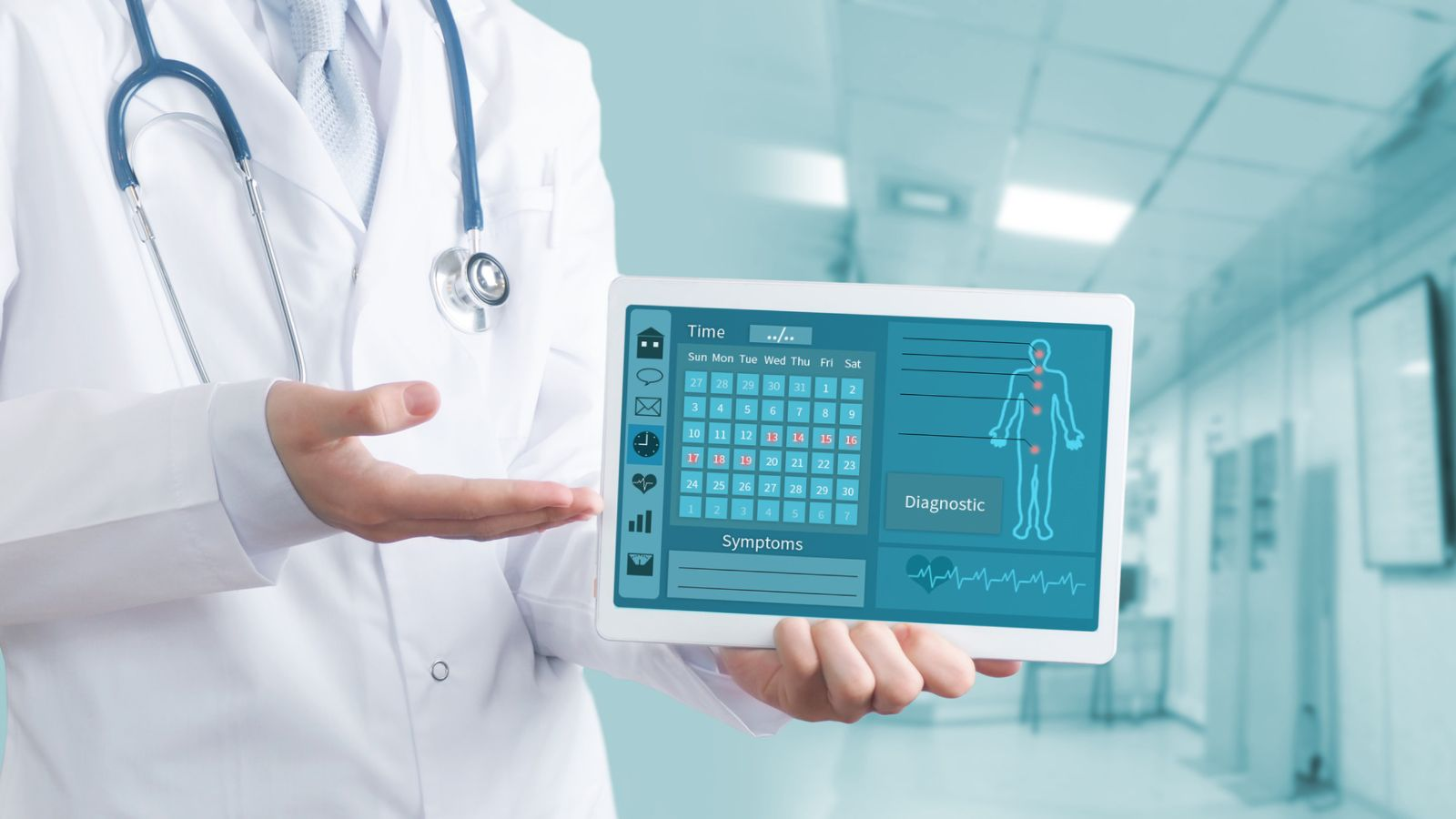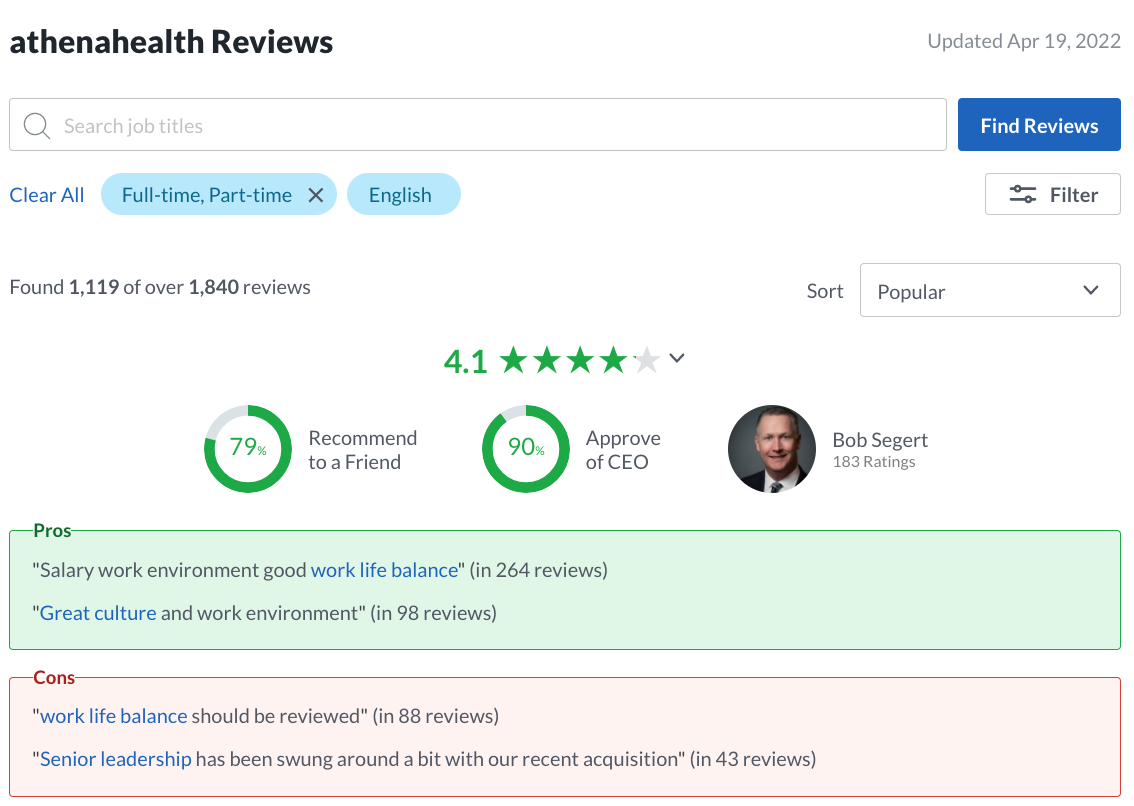
Healthcare software is any online tool, platform, or program that offers assistance and guidance to healthcare professionals in a healthcare setting, whether that’s a hospital, ICU, or nursing home.
Software salespeople are employed to sell specific types of this software to healthcare professionals, and as health and technological innovations continue to increase the number of software tools available, job opportunities will continue to pop up.
In this article, we’ll help you figure out if selling healthcare software is a job you’d enjoy. You’ll learn the ins and outs of healthcare software sales, how much reps earn on average, a few trends in the industry, and some of the top companies to work for in this space.
What it’s Like to Work in Healthcare Software Sales
As in most sales jobs, the bulk of your time will be spent sourcing and communicating with potential buyers over the phone, in-person, through email, or over video conference.
You’ll also spend time researching companies and the decision-makers within them to figure out how to best position your solution to their needs. The exact day-to-day responsibilities will depend on which type of healthcare software you’re selling.
If you’re an Account Manager, you’ll probably be helping your clients troubleshoot issues, roll out new features, or train their team on the tools.
The Different Healthcare Software Types
Within the category of healthcare software, there are many subcategories. Some of these are Electronic Health Record (EHR) software that hospitals track patient records, hospital management software, medical equipment software that helps monitor ICU patients’ health, and even diagnosis software that helps physicians analyze symptom information to find possible diagnoses.
As with your day-to-day, your common point of contact depends on which subcategory your product falls into. If you sold hospital management software, you’d likely be selling to executives who run a hospital, while also getting their key physicians on board. With other software types, you may sell to clinic managers or nursing home CEOs.
If your tool helps with management, billing, or legal issues that healthcare professionals encounter, you may talk mostly with a manager, accounting head, or legal team, respectively, when selling your product.
In most cases, you’ll need to get a sign-off from the higher-ups at the organization, since peoples’ health, as well as the organization’s reputation, depends on the functionality of the software. In all cases, you’ll also work hand in hand with the healthcare IT staff to determine how the solution will fit in with their current set of software tools.
As you can see, there are a lot of influencers and decision-makers involved in picking software for their business, meaning you’ll need excellent relationship management skills and the ability to tailor your messaging to each person’s specific interests and needs.
Healthcare Software Sales Compensation
The average base salary for a healthcare software sales representative is $81,968 per year, according to ZipRecruiter’s data.
That number, however, doesn’t take into account the average on-target commission (what you get if you hit quota), which, in software sales, is usually equal to the base salary; hence, avg. commission should be around 80k, bringing the total average earnings for healthcare software sales reps closer to $160,000 per year.
Later on, in the healthcare software companies section, we’ll share average earnings for different positions at each company.

How to Succeed in Healthcare Software Sales
There are some specific best practices you can follow to be successful (e.g., crush your quota) in a healthcare software sales job:
- Know When to Move On: Some hospitals or healthcare orgs are not a good fit. If one dropped all their money on Epic Systems’ software, for instance, it’s unlikely they’ll want to try another EMR software. This saves you the time you can devote to better leads.
- Be Patient: Hospitals move incredibly slow when deciding on implementing new software, so you have to be patient and give them their time to decide on your solution.
- Research the Buyer Heavily: These software tools are often designed for healthcare facilities of specific sizes, needs, and specialties, so you have to make sure you understand and qualify the buyer before dedicating time to selling them.
- Know the Healthcare Software Space: Know the competitors in your field and understand why customers might choose them over your tool, or vice versa. Also, study which tools complement your own, and know why. This helps you pitch.
- Find an Internal Champion: Having someone within the organization who raves about your product is a huge help. The more clinical your software, the more you’ll want to get a senior physician as your advocate. Not only can they sell to their colleagues, but they can also help you sell by telling you the decision-making process and potential roadblocks to overcome and decision-makers to convince.
- Role Play Before Meetings: After securing a meeting with the org, you should research each title that will or may be present in the meeting and then list out their common motivations and concerns. Then, practice having conversations with each title so you know what to say come game time.
For more tips on how to succeed in this role, check out this interview of health IT expert Jack Williams, in which he shares advice on how new healthcare software sales reps can succeed, especially those selling EMR systems.
Trends in Healthcare
As a sales rep, you need to prove to your clients that you’re knowledgeable about the industry and its technology. That’s one of the main ways in which you gain their trust. One of the best ways to come across as an expert is by staying up to date on healthcare trends, especially ones that involve software.

Below are some trends in the healthcare industry:
- Virtual Care: Telehealth is on the rise, and companies need to implement new payment and billing systems as well as operational protocols to support this desirable method of receiving healthcare. Software is often involved in this adaptation of strategy.
- Artificial Intelligence: Caregivers can utilize artificial intelligence to analyze data and make better decisions in regard to prescriptions, management, diagnosis, and more.
- Automation: Repetitive tasks and administrative work are being automated so that healthcare professionals can spend more time with patients, doing research, or handling their core functions, which are often more fulfilling.
- Emphasis on Mental Health: After the pandemic, an event that pushed many healthcare professionals well past the brink of exhaustion, healthcare executives are trying harder to safeguard their team members’ mental health. Software tools that save them time can help with this.
Being conversant in these areas will give you a leg up on any sales rep who just knows their product and nothing else. Plus, reading over healthcare trends is a great way to measure your interest in the field before jumping into a sales position that has you talking and thinking about healthcare five days a week.
3 of the Best Healthcare Software Companies to Work For
Let’s take a look at some of the largest healthcare software companies that hire salespeople — McKesson, GE Healthcare, and Athenaheatlh. We’ll tell you a little about what they sell, how much they pay, and what employees think about working there.
McKesson Corp
McKesson is a public company that provides software to hospitals, physician offices, home care agencies, imaging centers, and other healthcare establishments.
Account Managers here make about $96,000 per year according to Glassdoor’s data. Meanwhile, its Account Executives earn around $130,000 per year. This company seems to hire more Account Managers than Executives, likely because they rely on their brand name to generate new leads.
The company has a 3.8 rating as a place to work, and 88% of employees polled approve of the CEO. It’s a big player in the space, so having it on your resume is likely going to help you get future jobs in the healthcare software industry.
GE Healthcare
GE Healthcare is the healthcare arm of the conglomerate, and it sells software for medical imaging, medical research, and analysis.
Sales Representatives here earn a whopping average of $185,000 per year, and Account Managers bring in around $141,000 a year.
The company has a 4.0 rating as a place to work, and 83% of 4,314 former and current employees would recommend working there to a friend. Many reviewers wrote “good environment, good colleagues, and good benefits.”
Athenahealth
Athenahealth is a healthcare software company that sells internet and cloud-based services for billing, business, and clinic-related practice management.
The average earnings for a Sales Executive at Athenahealth is $135,000 per year. Account Managers, on the other hand, bring in about $90,000 per year on average.
90% of past and current employees polled on Glassdoor approve of the CEO, and 79% of them would recommend taking a job here to a friend:
Is Healthcare Software Sales Right for You?
Now that you know about what it’s like to sell healthcare software, you should have a better idea if it’s the right industry for you to grow as a sales professional. People will like this field if they find healthcare interesting, want to work closely with medical professionals, and consider it noble and meaningful to help caregivers serve their patients.
If you’re interested, head over to our software sales job board and look through the healthcare software jobs. If you’re still doing your research before your next big career move and sending in applications, consider reading some of our other industry articles like the one on financial software sales or education software sales.

 Glassdoor
Glassdoor Glassdoor
Glassdoor Glassdoor
Glassdoor